Goats for Sale
Although we would love to keep all the goats born at Lautercreek Farm, it’s important for us to keep a herd small enough to manage with ease and careful attention. If you are interested in any of the goats for sale below, please get in touch with us here.
We raise and sell ADGA American Alpines, ADGA Nigerian Dwarfs, and Mini Alpines.
Available Goats
We have no goats for sale at this time. Check back later!
interested in a goat for sale?
Contact us here if you are interested in one of our goats for sale and would like to place a reservation.
We’re firm believers in allowing our kids to be dam-raised whenever possible. Kids are ready for their new homes after they are weaned at 8-12 weeks.
If you would like to place a reservation for a kid before they are weaned, a $50 deposit (deducted from the base price) is required. This will take them off of the ‘goats for sale’ list. The kid with the deposit will be ready to be picked up when they are weaned at 8-12 weeks. This deposit is non-refundable unless something happens to the goat on our end or we decide to retain the kid.
The remainder of the purchase price (minus the deposit) is due on pickup.
See our goats for sale above!
Previous Goats for Sale
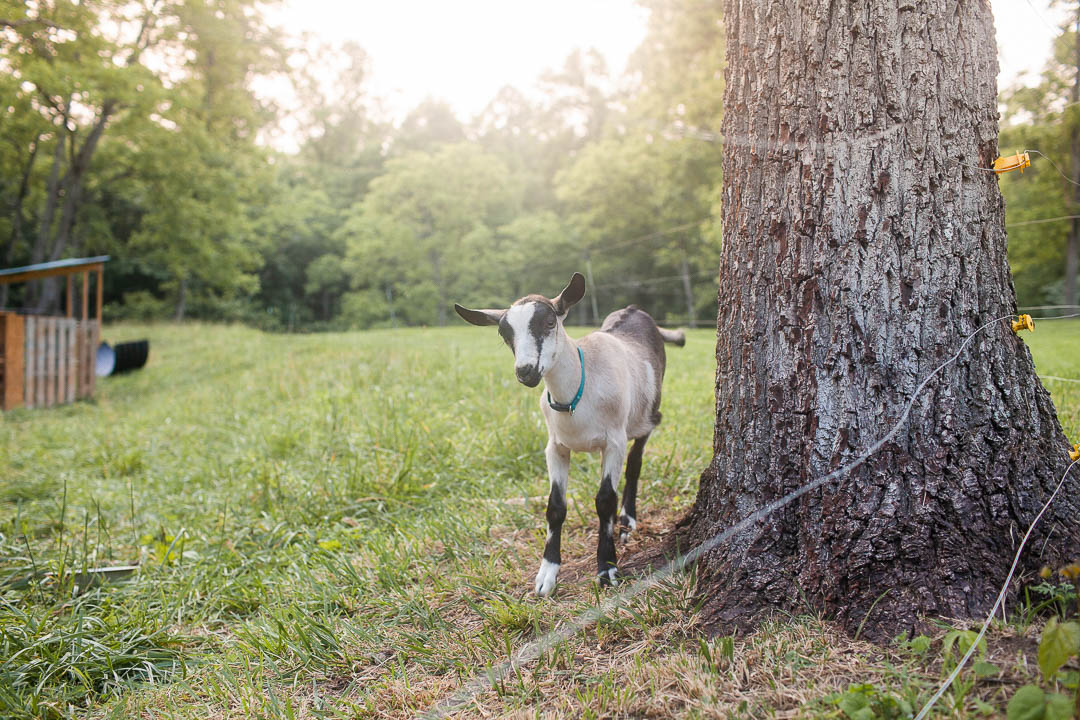
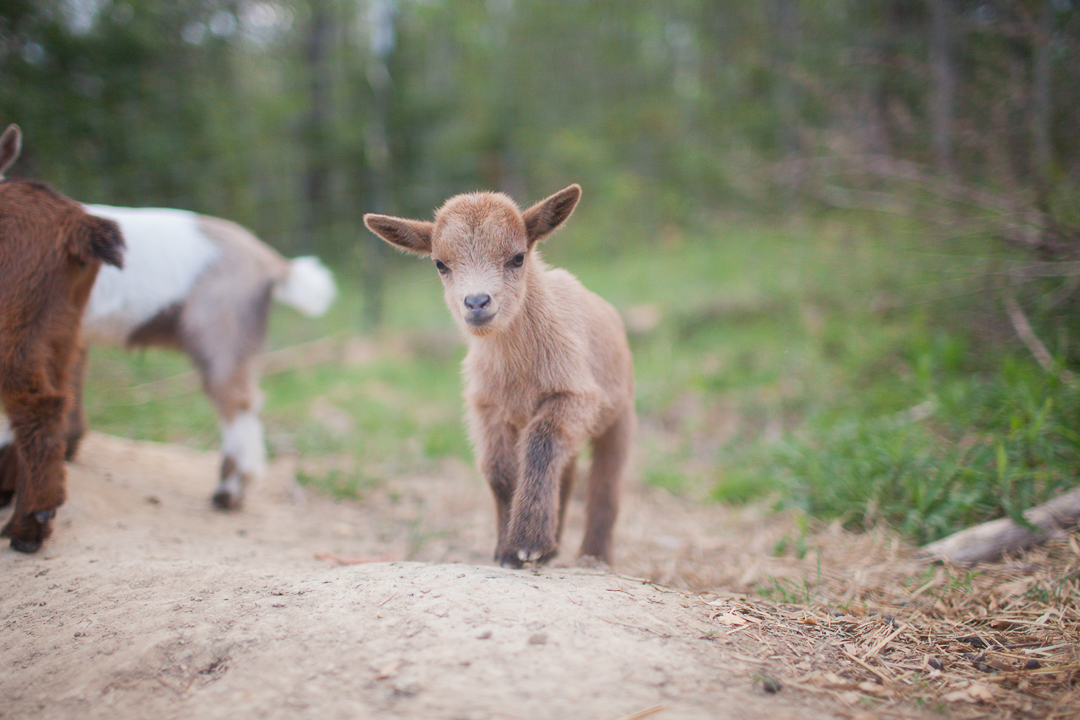
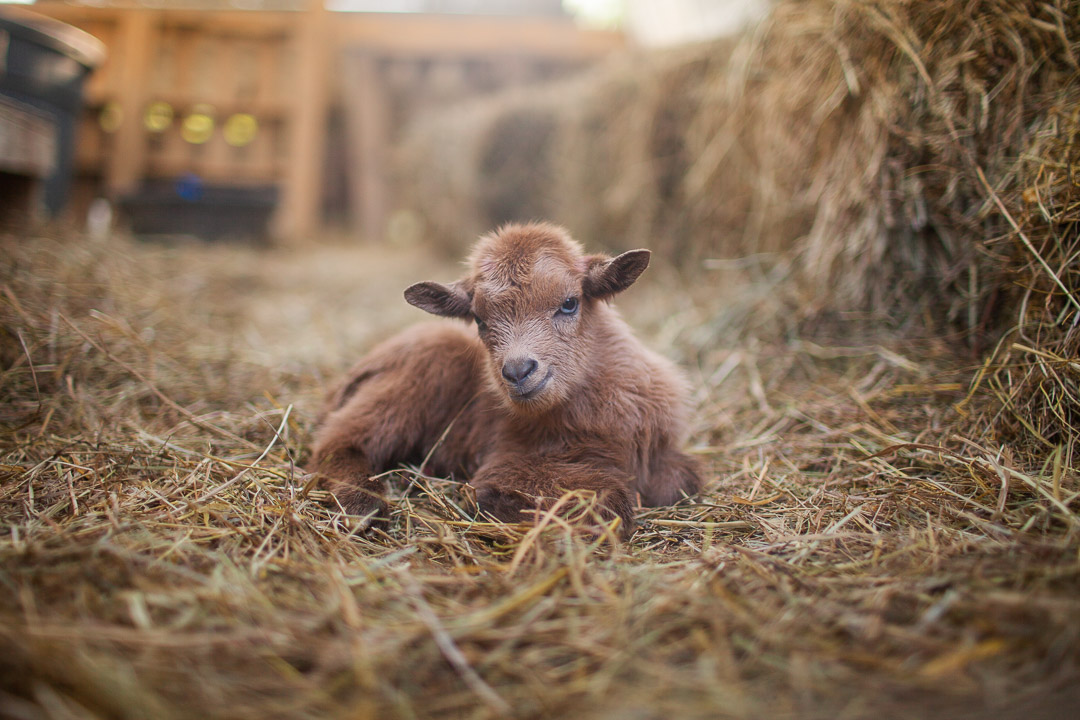
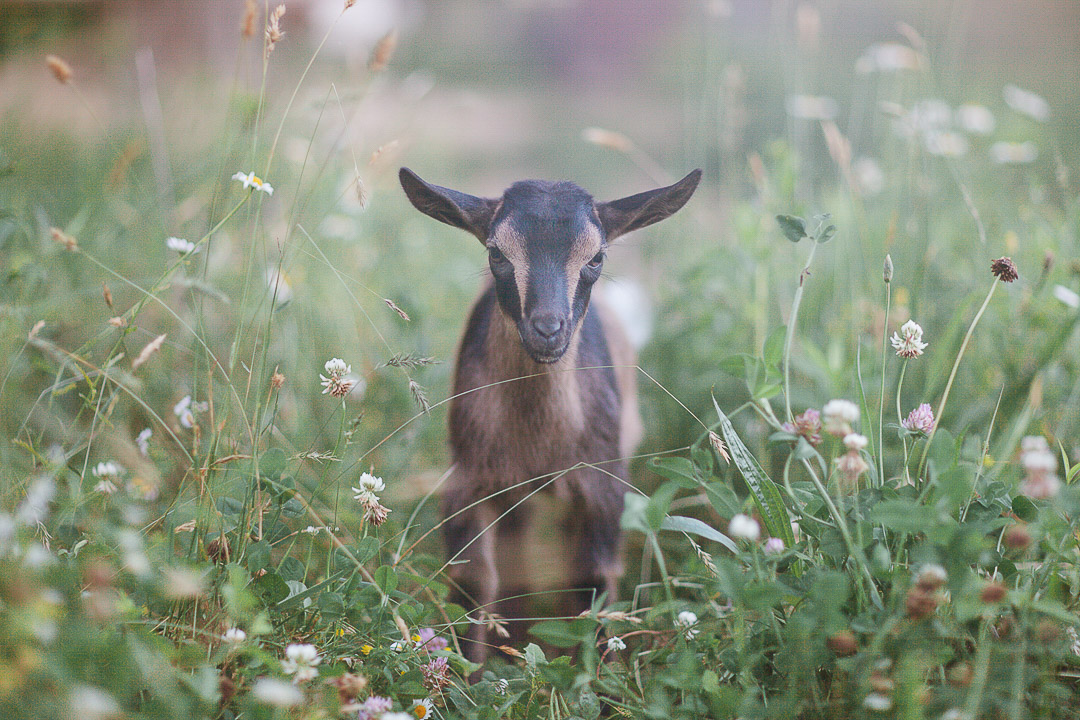
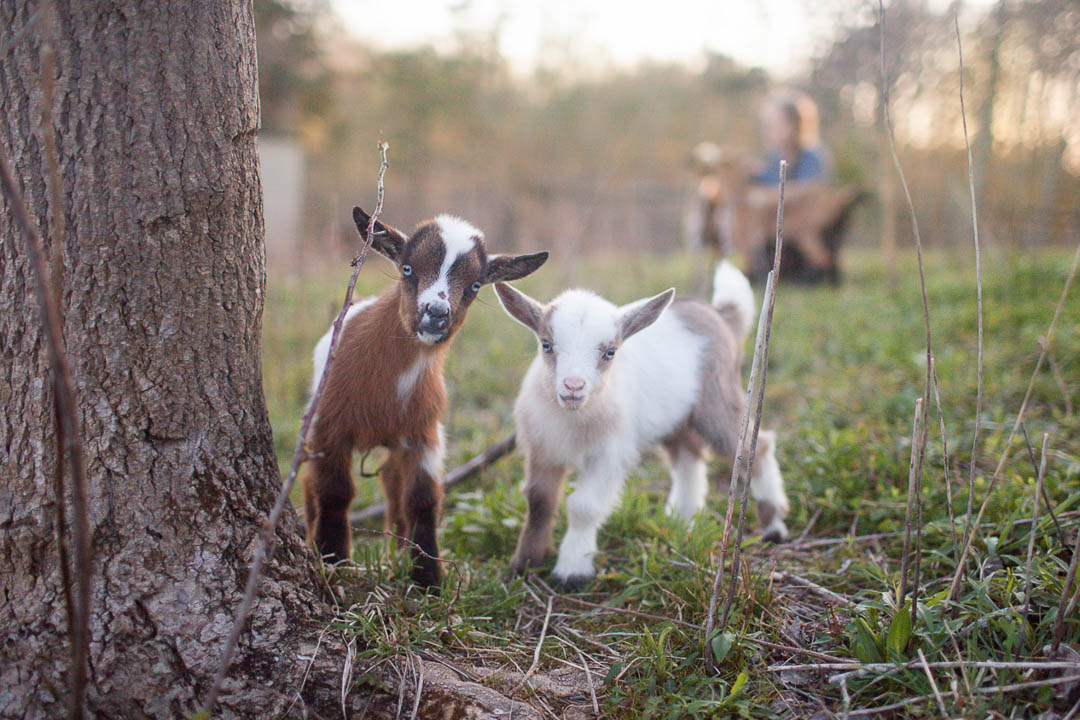
Goats for Sale Q + A
Will the goats be vaccinated?
All goats for sale will be up-to-date on CD/T.
For more info: All of our kids will be given CD/T vaccine at 8 weeks and 12 weeks of age, unless otherwise requested. This vaccine protects the goat from overeating disease and tetanus.
Overeating disease, or enterotoxemia, is caused by an overabundance of a certain bacteria called clostridium perfringens. All goats have this bacteria in small quantities, but under specific conditions, the bacteria can rapidly multiply and produce toxins. An excessive amount of grain, parasites, or even stress can cause the bacteria to bloom. The ‘CD’ in the CD/T vaccine helps goats develop an immunity to the bacteria.
Tetanus is another bacteria that lives everywhere – in soil, in manure, even on the goat’s skin. If the bacteria is confined to an oxygen-deprived area — such as a puncture wound— the tetanus bacteria will reproduce rapidly and release potent, lethal toxins.
If you wish to continue vaccinating with CD/T, you can buy the vaccine at Tractor Supply (here or here) and administer once a year. The dosage is 2ccs per goat – regardless of age – delivered subcutaneously.
Will they be dewormed?
All goats for sale will be checked for parasites, but only dewormed when necessary.
Long answer: I’ve put a lot of research into dewormers, and I’m very careful about how I use them. Similar to antibiotics, if you use a dewormer too much, it will lose its effectiveness. This is because the internal parasites will become accustomed to the dewormer if it’s constantly given, and become a sort of ‘super-parasite’ that isn’t able to be killed off by normal doses (similar to Wesley and the ‘locaine powder’ in the Princess Bride). Thus I try to only use dewormers when it’s necessary.
All goats on pasture have worms, but as disturbing as that sounds, goats are typically unaffected until there are an abnormally large number of them.
I have invested in the supplies to do my own parasite tests, so if I suspect that a goat may be struggling with parasites, I will test and deworm if necessary. All goats for sale will be tested before going to their new home.
What breed should I get?
Do you want a large reliable milk goat for your homestead, or do you want a pretty little easy-to-manage goat that you may want to milk occasionally for fun?
We raise Alpines for milk, and Nigerian Dwarfs for fun (and their delicious cream!).
If you want a friendly and pretty pet goat that produces about 1-2 cups a milking (if you so choose to milk), I recommend Nigerian Dwarfs.
If you’re serious about milk and want a dependable producer, get an Alpine.
We will have both Nigerian Dwarf Goats for sale and Alpine Goats for sale occasionally. If there are currently no goats available, Contact us if you’d like to join our waitlist, and we’ll notify you when we have more goats for sale.
Do I need more than one goat?
Goats are herd animals. As simple as it may sound to only care for one goat, you will regret it – the goat will be very unhappy, and express it by bleating at the top of his or her lungs all day long. Eventually, they will likely lose the will to live.
In short, if you are interested in any of our goats for sale, we will not sell individual goats unless you already have goats at home or are planning on getting more very soon.
Do you have any bottle baby goats for sale?
The majority of our kids are dam raised. We feel it is more natural for mama goats to raise their own kids, and it makes once-a-day milking possible with our heavy producers. While it’s often thought that kids must be bottle-raised to be friendly, we have not found this to be true at all – our dam-raised kids are just as eager to jump into our laps as our bottle-raised kids! Only in very specific circumstances will we have bottle baby goats for sale.
How do I care for a goat?
There are a hundred and one different ways to raise goats; this is just a brief rundown of how I raise my herd 🙂 .
Goats need good shelter, quality food, suitable minerals, and plenty of clean, fresh water. A little more about each below:
A good shelter can be as simple as a three-sided structure with a roof, but make sure to put down bedding, especially if your area is muddy. Goats don’t like to be in the mud, nor is it healthy for them. Bedding-wise, wood shavings or straw is my preference, or even dry hay: be cautious, however, when using old ‘discard’ hay; if your goats decide to eat old hay, they will possibly get sick and die.
For the same reason, don’t buy old hay for feeding goats. Though old, moldy hay that is unfit for horses is commonly labeled ‘goat’ hay, goats are as finicky as horses. They need high-quality hay free of mold, dust, and coarse stems. When purchasing hay for your goats, buy horse quality hay.
If your goats don’t have access to lush pasture, hay must be fed free choice. We don’t feed our goats hay during the summer months, but during the winter, when our pastures turn barren, we feed hay 24/7.
One last note about hay: it’s commonly said that alfalfa hay is deadly to bucks (due to urinary calculi – something I have never dealt with in our herd), but this isn’t true at all: it’s an unbalanced diet that causes problems. In fact, Alfalfa hay is probably among the best hay types for your herd because of its high protein content.
It’s also said that bucks shouldn’t be fed grain, but this is yet another myth.
We only give our goats grain in specific circumstances:
– when we notice that our goats are losing weight. I run my hand down their backs constantly, and when their BCS (Body Condition Score) drops to 2, I start supplementing with grain. This applies to both does and bucks.
– all of the milking does that we are currently milking for our own consumption get free-choice grain, plus a handful of Black Oil Sunflower Seeds (this is one thing that should not be fed to bucks because black oil sunflower seeds are high in phosphorus, which is the leading cause of urinari calculi)
While goats can get a lot of the minerals they need through foraging, few places in the world provide them with all of the minerals they need. For happy and healthy goats with the shiniest coats, I recommend feeding minerals free-choice. Avoid mineral blocks; they will damage a goat’s teeth, and they’re typically too high in salt. Try to get loose minerals instead. Surprisingly, there are only a few brands that provide the proper ratio of minerals. These include Purina, Manna-Pro, and Sweetlix Meatmaker. Unfortunately, the common DuMor brand, which is the cheapest, is not high enough in copper and lacks other essential nutrients.
Many people will recommend feeding goats baking soda free-choice, but it is not necessary. Unless your goats are being fed massive amounts of grain, as they would in the meat industry, goats produce enough of their own sodium bicarbonate without supplementing baking soda.
Finally, goats always need access to plenty of fresh, clean water, with emphasis on ‘clean’. Goats would often rather go thirsty than drink out of dirty water (even if they dirtied it themselves!).
If you need emergency help or are interested in learning more about goats, I highly recommend the Facebook Group Successful Goating With Rosie.
Should I get a buck or a doe?
If you just want to have a pet goat, I highly recommend getting a castrated buck, which is called a whether. While intact male goats are sweet, and we have never had an aggressive buck, there’s no getting around it: bucks are STINKY, especially during rut. Whethers are not stinky. Nor do they participate in the objectional behavior that intact goats do.
If you want to possibly milk some day, you’ll need a doe.
See ‘Goats for Sale’ above to browse what we have available. If you’re searching for a specific breed/gender/color, contact us and I’ll reach out to you when we have a potential goat for sale!
How much room do I need for goats?
According to Storey’s Guide to Raising Goats:
For the goat house: “The size of the building depends on several factors, including herd size; climate; size and availability of pasture; space for exercise, feed, and bedding storage requirements; and whether you need, want, or can manage a separate milking parlor. For example, standard recommendations range from 12 to 20 or 25 square feet (1 to 2 or 2.5 sq m) per animal. In warm climates you can go with the lower figure because animals spend more time outside. If there is a sizable pasture or exercise yard and the barn is used mainly as a dormitory, you could also get by with a smaller footprint.”
Goats thrive when they have lots of outdoor space, but they can be kept in a small area too. According to the internet, you need at least 400 square feet of yard for 2 goats (200sqft/goat, but you need at least 2 goats!). That’s a 20’x20′ pen. Of course, with this small of an area, you will need to provide hay 24/7.
If you have a few acres of lush pasture, or many more acres of poor pasture, you may be able to feed your goat off of the land during the warmer months. One recommendation is 1-3 goats per acre of land to produce 70% of your herd’s forage.
Our own experience is this: at the time of this writing, we have 6 goats and 1 pig roaming over about 5 acres, and we have not needed to supply hay during the summer. The 5 acre pasture consists of 1 acre of grassland and 4 acres of forest.
Despite what many say, goats are grazers AND browsers; they like open fields of grass just as much as they do forest.
Sales Policy
All goats will be hoof-trimmed, up-to-date on CD/T, and have no known medical conditions unless otherwise noted.
Buyer assumes complete responsibility for all expenses incurred and related to travel, veterinary, and all other health related issues upon animal/s leaving Lautercreek Farm. While each goat has been lovingly cared for since its birth, and we try our best to set our animals up for success, Lautercreek Farm is not responsible for temperament, future health, height, or quality of the animal after they’ve left the farm.
If you desire to reserve a kid before weaning, a $50 deposit (deducted from the base price) is required. The reserved kid will be ready to go to his or her new home when they are weaned at 8-12 weeks. This deposit is non-refundable unless something happens to the kid on our end, or we choose to retain the kid. The rest of the money is due on pickup.
All sales are final.
